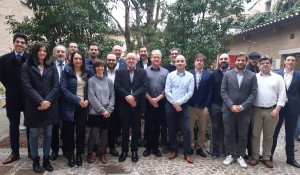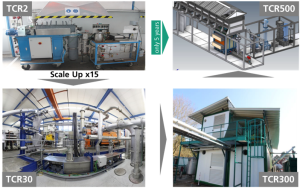The University of Bologna hosted the second Advisory Board meeting of the Horizon 2020 project TO-SYN-FUEL at the Fondazione Flaminia offices in Ravenna, Italy, on 18th of February 2020.
Discussions took place regarding the progress of the activities relating to this project which is focused on the integration of new technologies to produce renewable liquid fuels replacing fossil fuels.
The Advisory Board comprises invited experts and specialists to provide independent review, advice and guidance on the progress of the project activities. Moreover, all these associates would directly benefit by exploiting the technology at their operational sites.

For the conversion of biogenic residues to sustainable advanced biofuels, Fraunhofer UMSICHT developed and realised a new technology, named Thermo-Catalytic Reforming (TCR®). Starting from tests on a lab-scale unit to the fuel production demonstrated on a pilot scale, the TCR® technology was then scaled-up to a 300 kg per hour plant for the conversion of sewage sludge at an industrial rate, financially supported by the Bavarian State Ministry of Economic Affairs, Infrastructure, Transport and Technology.
The ongoing step of a technical demonstrator development is part of TO-SYN-FUEL. The operational capacity is designed for 500 kg per hour of dried sewage sludge. This is the actual step of development before the technology is reaching fully commercial scale.
The development process of this novel technology has shown a high potential in the utilization of biomass and residues.
Experts of CIRSA, the Inter-Departmental Centre for Research in Environmental Sciences of the University of Bologna, are committed in evaluating environmental performances and sustainability of current sewage sludge management and in comparing with the innovative solutions investigated in the project. Preliminary results from the life cycle assessment methodology have been reported during the meeting, analysing the first encouraging results related to the climate change parameters.

Dr.-Ing. Robert Daschner, Head of the Renewable Energy Department at Fraunhofer UMSICHT and Project Management Officer confirmed as follows: “In this project we want to produce advanced biofuels from waste, which in this particular case will be sewage sludge. We are building-up the plant and we will operate and demonstrate the technology in operation. By the end of the project we want to have a business case for sustainable green fuels in order to support the targets of the European Commission”.
This unit will be in operation from 2020 for around 5,000 hours and it will produce more than 200,000 litres of biocrude oil. TCR® will be combined with pressure swing adsorption (PSA) and hydrodeoxygenation (HDO) technologies in an integrated plant.
The first demonstration site visit of the working plant is expected to be organized for interested stakeholders and potential early adopters of the technology in a year.
CIRSA
The Inter-Departmental Centre for Research in Environmental Sciences (CIRSA) has been founded on October, 30th 2000, by the Departments of Mathematics, Physics, Biology, Chemistry and Geology of the University of Bologna, and started its activities in January, 1st 2001.
The Advisory Board members who attended the meeting in Ravenna:
TOTAL (France), EUBIA (Belgium), Lodge Cottrell (UK), Goodfuels (The Netherlands), IWO (Germany), Slibverwerking Noord-Brabant NV (The Netherlands).
Further information: http://www.tosynfuel.eu/
The content of this press release cannot be considered as the European Commission’s official position and neither the European Commission, TO-SYN-FUEL project consortium nor any person acting on behalf of these organisation is responsible for the use which might be made of it. Although TO-SYN-FUEL project endeavours to deliver a high level of service, no guarantee can be given on the correctness or completeness of the content of this press release and neither the European Commission, TO-SYN-FUEL project consortium are responsible or may be held accountable for any loss suffered as a result of reliance upon the content of this press release.


